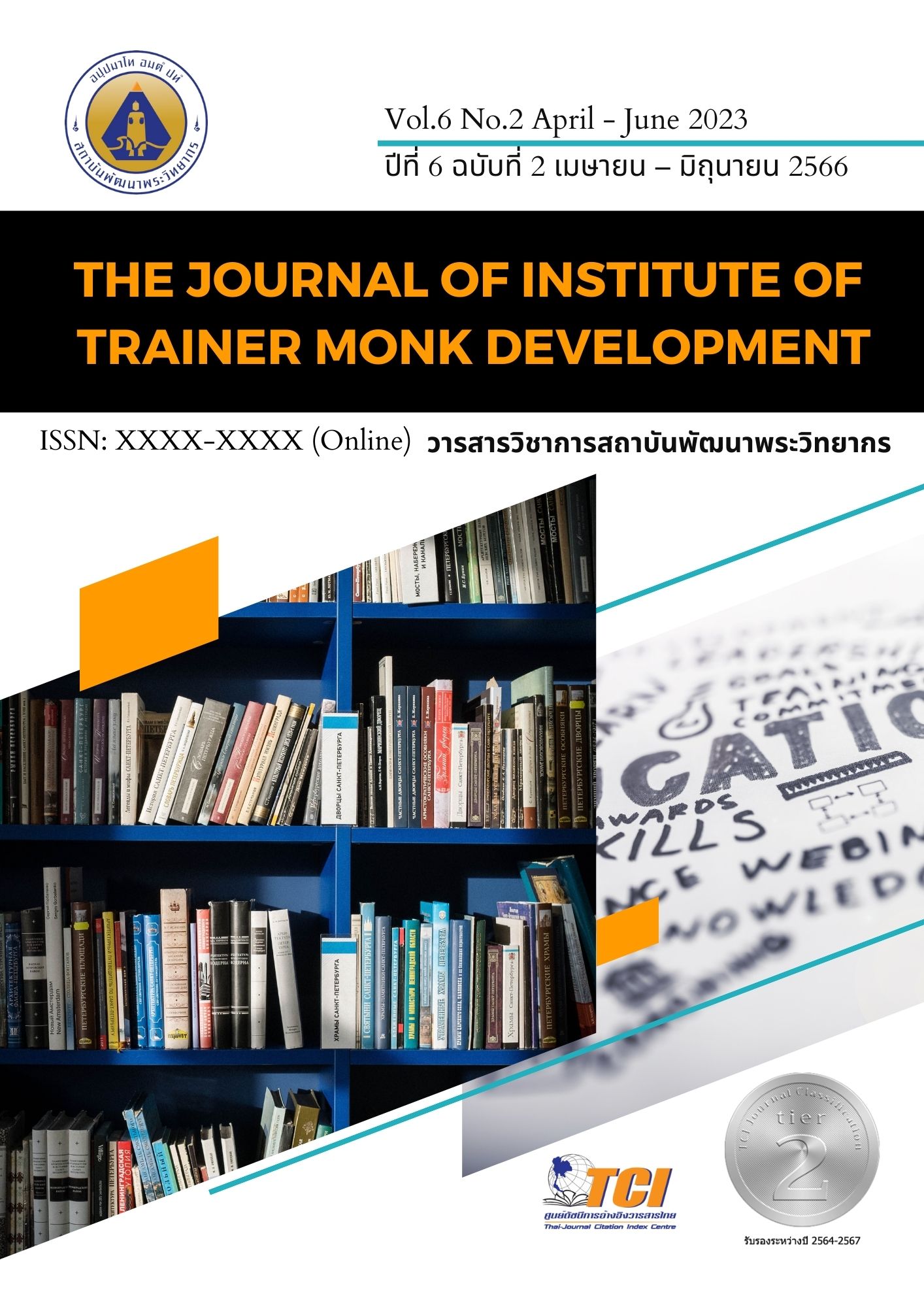The Effects of Instruction Emphasizing on Scientific Competencies in the Topic of Chemical Reaction on Scientific Learning Achievement and Scientific Competencies of Grade 9 Students at SetthabutBamphen School in Bangkok Metropolis
Main Article Content
Abstract
The purposes of this research were (1) to compare the post-learning scientific learning achievement of Grade 3 students who learned under the instruction emphasizing on scientific competencies with that of students who learned under the traditional learning management; (2) to compare scientific competencies level of Grade 3 students who learned under the instruction emphasizing on scientific competencies with that of students who learned under the traditional learning management; (3) to compare the pre-learning and post-learning scientific learning achievements of Grade 3 students who learned under the instruction emphasizing on scientific competencies; and (4) to compare the pre-learning and post-learning scientific competencies levels of Grade 3 students who learned under the instruction emphasizing on scientific competencies.
The research sample consisted of 66 Grade 3 students in two heterogeneous intact classrooms of Setthabut Bamphen School in Bangkok Metropolis, obtained by cluster random sampling. Then, one classroom containing 34 students was randomly assigned as the experimental group; while the other classroom containing 32 students, the control group. The instruments used in this research were (1) learning management plans for the instruction emphasizing on scientific competencies in the topic of Chemical Reaction and learning management plans for the traditional learning management; (2) a test on learning achievement in the topic of Chemical Reaction; and (3) a scale to assess scientific competencies. Statistics employed for data analysis were the mean, standard deviation, and t-test.
The research findings revealed that (1) the post-learning Chemical Reaction learning achievement of students who learned under the instruction emphasizing on scientific competencies and the counterpart learning achievement of the students who learned under the traditional learning management were not significantly different; (2) the scientific competencies level of the students who learned under the instruction emphasizing on scientific competencies was significantly higher than the counterpart competencies level of the students who learned under the traditional learning management at the .05 level of statistical significance; (3) the post-learning Chemical Reaction learning achievement of the students who learned under the instruction emphasizing on scientific competencies was significantly higher than their pre-learning counterpart achievement at the .05 level of statistical significance; and (4) the post-learning scientific competencies level of the students who learned under the instruction emphasizing on scientific competencies was significantly higher than their pre-learning counterpart competencies level at the .05 level of statistical significance.
Article Details

This work is licensed under a Creative Commons Attribution-NonCommercial-NoDerivatives 4.0 International License.
บทความที่ได้รับการตีพิมพ์เป็นลิขสิทธิ์ของวารสารวิชาการสถาบันพัฒนาพระวิทยากร
ข้อความที่ปรากฎอยู่ในบทความที่ได้รับการตีพิมพ์ในวารสาร ถือเป็นความรับผิดชอบของผู้เขียนบทความ และข้อคิดเห็นนั้นไม่ถือว่าเป็นทัศนะและความรับผิดชอบของกองบรรณาธิการวารสารวิชาการสถาบันพัฒนาพระวิทยากร
References
จุฑามาศ กันทะวัง. (2563). “การจัดการเรียนรู้โดยใช้แบบจำลองเป็นฐานวิชาชีววิทยา เพื่อพัฒนาผลสัมฤทธิ์ทางการเรียนและการให้เหตุผลเชิงวิทยาศาสตร์ ของนักเรียนชั้นมัธยมศึกษาปีที่ 4”. วิทยานิพนธ์ สาขาวิชาการสอนวิทยาศาสตร์. คณะศึกษาศาสตร์ มหาวิทยาลัยบูรพา.
ชวนัท มณีกร และวิชัย เสวกงาม. (2561). “แนวทางการจัดการเรียนการสอนวิทยาศาสตร์ที่ส่งเสริมการรู้วิทยาศาสตร์ของนักเรียนชั้นมัธยมศึกษาตอนต้น โรงเรียนสังกัดมูลนิธิแห่งสภาคริสตจักรในประเทศไทย”. วารสารอิเล็กทรอนิกส์ทางการศึกษา OJED, (13)(2): 121-133.
ชาตรี ฝ่ายคำตา และภรทิพย์ สุภัทรชัยวงศ์. (2557). “การจัดการเรียนรู้โดยใช้แบบจำลองเป็นฐาน”. วารสารศึกษาศาสตร์ปริทัศน์ มหาวิทยาลัยเกษตรศาสตร์, (29)(3): 86-99.
ณัฐชา พัฒนา และคณะ. (2562). “ผลการจัดการเรียนรู้ตามรูปแบบสะเต็มศึกษาที่มีต่อผลสัมฤทธิ์ทางการเรียนวิชาเคมี เรื่อง เคมีอินทรีย์ และความคิดสร้างสรรค์ทางวิทยาศาสตร์ของนักเรียน ชั้นมัธยมศึกษาปีที่ 6 โรงเรียนปากช่อง จังหวังนครราชสีมา”. วารสารศึกษาศาสตร์ มสธ., (12)(2): 118-132.
พัทธดนย์ อุดมสันต และคณะ. (2562). "การพัฒนาการรู้วิทยาศาสตร์โดยการจัดการเรียนรู้ที่ใช้กระบวนการ ออกแบบเชิงวิศวกรรมตามแนวคิดสะเต็มศึกษา เรื่อง แสงและทัศนอุปกรณ์ของนักเรียนชั้นมัธยมศึกษาปีที่ 5". วารสารศึกษาศาสตร์ มหาวิทยาลัยมหาสารคาม, (13)(3): 118-130.
พุทธริธร บูรณสถิตวงศ์ และคณะ. (2562). “การพัฒนาสมรรถนะการอธิบายปรากฏการณ์ในเชิงวิทยาศาสตร์และสมรรถนะการแปลความหมายข้อมูลและประจักษ์พยานในเชิงวิทยาศาสตร์ ของนักเรียนชั้นมัธยมศึกษาปีที่ 4 ด้วยการจัดการเรียนรู้วิทยาศาสตร์โดยการใช้สื่อโฆษณา เรื่อง ระบบย่อยอาหาร”. วารสารศึกษาศาสตร์ มหาวิทยาลัยนเรศวร, (21)(2): 212-224.
รัชฎา ศิลมั่น. (2552). “การประยุกต์ใช้กิจกรรมการเรียนรู้แบบ 5E เพื่อพัฒนาสมรรถนะทางวิทยาศาสตร์ของนักเรียนชั้นมัธยมศึกษาปีที่ 3 โรงเรียนไทยรัฐวิทยา 69 (คลองหลวง) จังหวัดปทุมธานี”. ปริญญานิพนธ์ สาขาการวิจัยและสถิติทางการศึกษา. บัณฑิตวิทยาลัย มหาวิทยาลัยศรีนครินทรวิโรฒ.
ราตรี ยะคํา และคณะ. (2563). “การวิจัยปฏิบัติการเพื่อศึกษาแนวการจัดการเรียนรู้โดยใช้แบบจำลองเป็นฐาน เพื่อพัฒนา สมรรถนะการอธิบายปรากฏการณ์ในเชิงวิทยาศาสตร์ของนักเรียน ชั้นมัธยมศึกษาปีที่ 5 เรื่อง เชื้อเพลิงซากดึกดำบรรพ์และผลิตภัณฑ์”. วารสารศึกษาศาสตร์ มหาวิทยาลัยนเรศวร, (22)(1): 190-203.
ลือชา ลดาชาติ และลฎาภา ลดาชาติ. (2562). "การเรียนการสอนที่เน้นสมรรถนะ". วารสารศึกษาศาสตร์ มหาวิทยาลัยขอนแก่น, (42)(4): 1-19.
ศรีบุญตาม โจมศรี. (2553). “ผลการจัดกิจกรรมการเรียนรู้ เรื่อง พันธะเคมี ชั้นมัธยมศึกษาปีที่ 4 โดยใช้วัฏจักรสืบเสาะหาความรู้ (5E) ร่วมกับแผนผังมโนมติ”. วิทยานิพนธ์ สาขาวิชาศึกษาศาสตร์. คณะศึกษาศาสตร์มหาวิทยาลัยขอนแก่น.
สถาบันส่งเสริมการสอนวิทยาศาสตร์และเทคโนโลยี. (2564). ผลการประเมิน PISA 2018 การอ่าน คณิตศาสตร์ และวิทยาศาสตร์ กรุงเทพฯ: สสวท.
สำนักงานเลขาธิการสภาการศึกษา. (2560). แผนการศึกษาแห่งชาติ พ.ศ. 2560 – 2579 กรุงเทพฯ: พริกหวาน กราฟฟิค.


